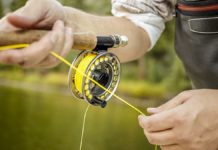Will Benson stands on the platform of a mint green fishing boat, under a white-hot sun, and whipsaws a fly fishing rig over azure waters as glassy as an aquarium. The water is no more than 10 feet deep. Dreadlock Holiday plays on the radio. His son Luke, six, watches.
He lets the lure fly – wheeeeeeeeesh. It sails over the silhouettes of two nerf sharks, one lemon shark and to the immediate left of an elusive school of permit, sparking some interest but no bites. They roll over, silvery fins glancing at the surface.
This stretch of paradise is called the Florida Keys national marine sanctuary, and for six months not a single cruise ship has plowed its shallow and heavily used channel, leaving locals in relative peace and with clear waters many say they have not seen in decades.
Now, a group of Key West residents would like to keep it this way.
“It’s not that we don’t want cruise ships,” Benson said. “The reality is it’s not even good business,” he said, because it is destroying the environment which makes the Keys so special.
The water below Benson’s boat is as clear as a window pane, and the best that he, a fishing guide with the Lower Keys Guides Association, has seen in 30 years. He hands the pole to Luke, “You have the magic touch Luke, c’mon.”
When Covid-19 hit in March, the Keys were locked down. A roadblock on Route 1, the string of bridges which connects the islands of the Keys, turned away southbound non-resident traffic.
Then the US Centers for Disease Control and Prevention issued a no-sail order for cruise ships. That left Duval Street, which ends on popular Mallory Square and one of the city’s three piers, “pitch black”, with “no life”, in the words of a local cop who patrolled the empty district.
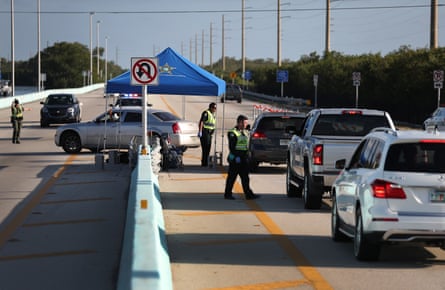
But it also left the environment with time to recover, and local people with time to think.
“What Covid has allowed people to think about is a little reset,” said Arlo Haskell, a writer whose work focuses on the history of Key West. “Is this where we want to be? Is this who we want to be?”
For many, the answer was no. Haskell and a handful of other locals formed the Key West Committee for Safer Cleaner Ships, with the goal of shrinking the footprint of cruise ship tourism in Key West. They wanted to limit the community’s exposure to Covid-19 and, frankly, to what they saw as destructive tourism.
“The city’s position was, ‘We can’t do anything about it’,” said Haskell regarding the number of passengers and cruise ships coming through Key West. “And we said, ‘Yes, we can’.”
They collected enough signatures to get three referendum questions on the November ballot. One limits the size of ships to much smaller vessels, another limits the number of passengers who can disembark in Key West, and a third prioritizes ships with good environmental records.
“Covid and the links between Covid and cruise ships got us going,” said Haskell, “and the you-can-see-it-with-your-own-eyes environmental benefits have sustained us.”
The referendum has set up a battle between a broad coalition of residents – fishermen, hoteliers, independent shop owners – and an industry dominated by corporations and ever larger ships.
“We’re at a philosophical crossroads all over our world,” said Benson, as the boat crossed a bed of turtle grass near one of the main cruise ship docks, and fish flitted beneath the surface. “And we want our fucking island back.”
A roughly one-mile stretch through the marine sanctuary used to be the cruise ship superhighway. Exactly 417 cruise ships docked here in 2019, according to the Key West chamber of commerce.
When Benson thinks of cruise ships, he often thinks of Milton Friedman, the Nobel prize-winning economist, and his landmark essay, The Social Responsibility of Business is to Increase its Profits. The essay is often distilled to this edict: “greed is good”.
“This issue is a clear example of that playing out at the community level,” Benson said, as he pulled his small craft alongside privately owned Pier B. “There’s a moral responsibility corporations have to serve the employees, to serve the public,” said Benson. The cruise ship industry in Key West has lobbied for one thing in Benson’s experience: “more cruise ships, bigger cruise ships”.
Cruise ships brought 910,000 people to three piers in the city of 24,000, according to the Florida Ports Council. It is one of the busiest ports and most popular tourist destinations in America.
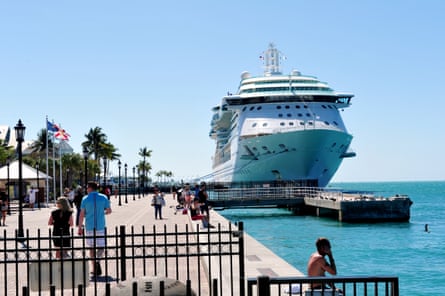
The cruise ship industry has grown steadily in Key West from 1999, when 597,000 passengers visited the city, to 910,000 in 2019. Before 1969, there were no regularly scheduled cruises to Key West.
Key West would not be the first destination to limit cruise ship traffic. Cannes, France; Santorini, Greece; and Venice, Italy, have all placed limits on cruise ships or their passengers for environmental or social reasons.
Benson pointed to a piece of sunken, plastic detritus. “Before this, I had never looked down here and seen the actual bottom,” he said. “You didn’t know that stuff existed.”
That garbage would have normally been obscured by marine dust clouds stirred up by propellers in a process called “siltation”. This fine sand is known to smother the ocean floor-dwelling creatures foundational to this habitat: young coral, sea grass and sponges.
Kate Miano, who owns the Gardens Hotel, sees exactly this kind of degradation as problematic. She believes Key West should be an “eco-destination”.
“It shouldn’t be all, ‘Let’s get a drink off the cruise ship’,” said Miano. “We’re cutting off our nose to spite our face.”
Under the referendum proposed by the Committee for Safer Cleaner Ships, only about 35 ships scheduled to make port calls in the Caribbean in 2020 would meet its size limits, significantly limiting the “bulldozer” effect Benson said he witnesses daily.
A second referendum would allow no more than 1,500 people a day to disembark from ships. On peak days in 2019, 12,000 crew and passengers would have visited the port, according to the committee. Finally, the referendum would require Key West to prioritize ships with the best environmental record for port calls.
The chamber of commerce balks at these size limits, however.
If the referendums pass, it would “essentially shut off cruise ships from coming to Key West”, said Scott Atwell, the chamber’s CEO. The chamber argues that will cause the city to lose income, lay off workers, and result in the loss of nearly 800 jobs.
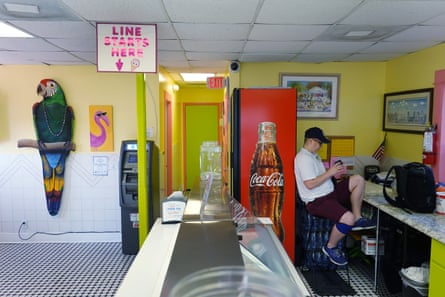
Anecdotally, some locals believe the worst-hit shops in Key West are those relying on volume, as empty T-shirt shops along Duval Street attest. The Cruise Line International Association, the industry’s lobbying group, has not weighed in directly, but has been polling locally on the issue.
Meanwhile, the committee has been sued – three times – in an effort to have the referendum questions removed from the ballot. Plaintiffs included bar pilots (who help lead cruise ships to port), the owners of private Pier B, and a contingent of successful restaurateurs.
Criticism of cruise ships in Key West comes at a time when they are under increasing pressure globally for contributing to climate change and environmental degradation. It also comes after a “devastating” spring, in which Covid-19 spread early and rapidly onboard ships before they shut down operations.
“It would be impossible, in the absence of a good vaccine, to completely prevent Covid from getting onboard,” said Sloane. “Though they could certainly reduce that a lot by having everybody get tested.”
Globally, the Cruise Lines International Association had expected 2020 to be a banner year, with 32 million travelers compared with just 17.8 million in 2009.
But then Covid-19 hit, first onboard the Diamond Princess, a ship which sailed to Japan and became the largest cluster of Covid-19 outside mainland China in early February. In a case of contagion, which will probably be investigated for years to come, studies suggest one passenger from Hong Kong helped spread Covid-19 to 700 passengers and crew.
Then came ships such as the Grand Princess, which sailed from San Francisco to Mexico. As crew and passengers fell ill, a “response team” had to be helicoptered in. In five weeks in February and March, 17% of all Covid-19 cases in the US could be traced to cruise ships, a March report from the CDC revealed, and Covid-19 cases in 15 states could be linked back to the ships.
By April, cruise ships suspended service, but more than 80,000 cruise crew members were stranded aboard 100 ships in port or at sea. Even now, as the international cruise operations resume, more than a dozen crew members onboard the first post-lockdown Greek cruise ship have tested positive for Covid-19. The ship is now moored. Now, cruise lines are hoping to set sail on 31 October, after the Trump administration “overruled” the CDC director, Dr Robert Redfield.
Sloane does not believe limiting the size of cruise ships is an effective Covid-19 infection control strategy – “Why are they singling out the cruise ships as opposed to people coming down for the weekend from Miami?” – but concedes the cruise industry faces a “dilemma”.
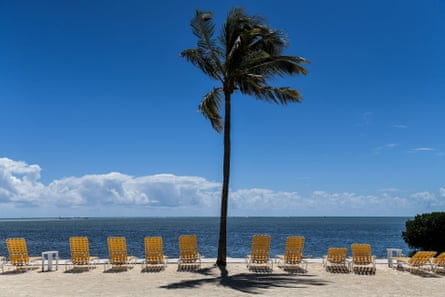
They shared a common DNA with prisons and nursing homes, he argues: close quarters. Onboard ships, people socialize in buffets, bars and theaters. They have faced challenges containing respiratory diseases such as flu in the past. They’re now being sued by passengers infected with Covid-19.
The industry has proposed substantial changes, including masks, testing and shorter trips. But can ships make people feel safe from Covid-19, reduce their carbon footprint and significantly reduce their impact on local communities?
Sloane wonders. “Those folks from Key West have a real good point – that too many people can love a place to death, and then you lose the charm that was there,” said Sloane. Then, “all you have basically is a thing to sell, and photo ops”.
Credit: Source link






















